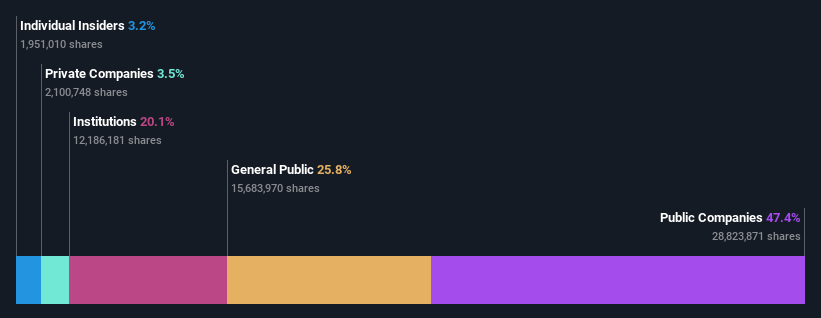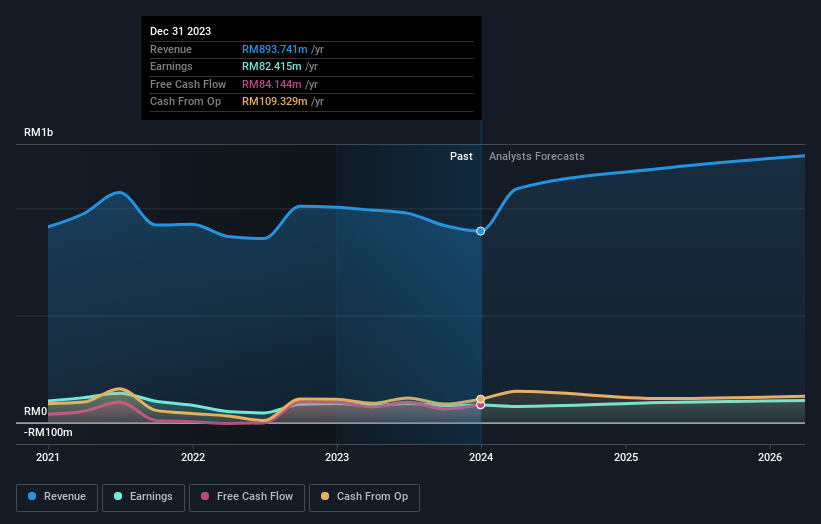Individual investors own 26% of Panasonic Manufacturing Malaysia Berhad (KLSE:PANAMY) shares but public companies control 47% of the company
Key Insights
The considerable ownership by public companies in Panasonic Manufacturing Malaysia Berhad indicates that they collectively have a greater say in management and business strategy
The top 2 shareholders own 59% of the company
Institutional ownership in Panasonic Manufacturing Malaysia Berhad is 20%
A look at the shareholders of Panasonic Manufacturing Malaysia Berhad (KLSE:PANAMY) can tell us which group is most powerful. And the group that holds the biggest piece of the pie are public companies with 47% ownership. Put another way, the group faces the maximum upside potential (or downside risk).
And individual investors on the other hand have a 26% ownership in the company.
Let's delve deeper into each type of owner of Panasonic Manufacturing Malaysia Berhad, beginning with the chart below.
Check out our latest analysis for Panasonic Manufacturing Malaysia Berhad

What Does The Institutional Ownership Tell Us About Panasonic Manufacturing Malaysia Berhad?
Institutions typically measure themselves against a benchmark when reporting to their own investors, so they often become more enthusiastic about a stock once it's included in a major index. We would expect most companies to have some institutions on the register, especially if they are growing.
We can see that Panasonic Manufacturing Malaysia Berhad does have institutional investors; and they hold a good portion of the company's stock. This can indicate that the company has a certain degree of credibility in the investment community. However, it is best to be wary of relying on the supposed validation that comes with institutional investors. They too, get it wrong sometimes. When multiple institutions own a stock, there's always a risk that they are in a 'crowded trade'. When such a trade goes wrong, multiple parties may compete to sell stock fast. This risk is higher in a company without a history of growth. You can see Panasonic Manufacturing Malaysia Berhad's historic earnings and revenue below, but keep in mind there's always more to the story.

Panasonic Manufacturing Malaysia Berhad is not owned by hedge funds. Looking at our data, we can see that the largest shareholder is Panasonic Holdings Corporation with 47% of shares outstanding. For context, the second largest shareholder holds about 12% of the shares outstanding, followed by an ownership of 5.7% by the third-largest shareholder.
A more detailed study of the shareholder registry showed us that 2 of the top shareholders have a considerable amount of ownership in the company, via their 59% stake.
Researching institutional ownership is a good way to gauge and filter a stock's expected performance. The same can be achieved by studying analyst sentiments. There is a little analyst coverage of the stock, but not much. So there is room for it to gain more coverage.
Insider Ownership Of Panasonic Manufacturing Malaysia Berhad
The definition of an insider can differ slightly between different countries, but members of the board of directors always count. Management ultimately answers to the board. However, it is not uncommon for managers to be executive board members, especially if they are a founder or the CEO.
Insider ownership is positive when it signals leadership are thinking like the true owners of the company. However, high insider ownership can also give immense power to a small group within the company. This can be negative in some circumstances.
Our most recent data indicates that insiders own some shares in Panasonic Manufacturing Malaysia Berhad. It has a market capitalization of just RM1.1b, and insiders have RM35m worth of shares, in their own names. Some would say this shows alignment of interests between shareholders and the board. But it might be worth checking if those insiders have been selling.
General Public Ownership
The general public-- including retail investors -- own 26% stake in the company, and hence can't easily be ignored. While this size of ownership may not be enough to sway a policy decision in their favour, they can still make a collective impact on company policies.
Private Company Ownership
Our data indicates that Private Companies hold 3.5%, of the company's shares. Private companies may be related parties. Sometimes insiders have an interest in a public company through a holding in a private company, rather than in their own capacity as an individual. While it's hard to draw any broad stroke conclusions, it is worth noting as an area for further research.
Public Company Ownership
It appears to us that public companies own 47% of Panasonic Manufacturing Malaysia Berhad. This may be a strategic interest and the two companies may have related business interests. It could be that they have de-merged. This holding is probably worth investigating further.
Next Steps:
I find it very interesting to look at who exactly owns a company. But to truly gain insight, we need to consider other information, too. Consider risks, for instance. Every company has them, and we've spotted 1 warning sign for Panasonic Manufacturing Malaysia Berhad you should know about.
Ultimately the future is most important. You can access this free report on analyst forecasts for the company.
NB: Figures in this article are calculated using data from the last twelve months, which refer to the 12-month period ending on the last date of the month the financial statement is dated. This may not be consistent with full year annual report figures.
Have feedback on this article? Concerned about the content? Get in touch with us directly. Alternatively, email editorial-team (at) simplywallst.com.
This article by Simply Wall St is general in nature. We provide commentary based on historical data and analyst forecasts only using an unbiased methodology and our articles are not intended to be financial advice. It does not constitute a recommendation to buy or sell any stock, and does not take account of your objectives, or your financial situation. We aim to bring you long-term focused analysis driven by fundamental data. Note that our analysis may not factor in the latest price-sensitive company announcements or qualitative material. Simply Wall St has no position in any stocks mentioned.
